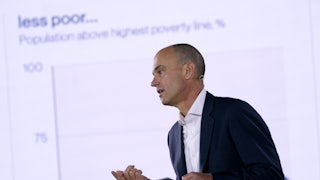A new poll measuring voter sentiment in and around six factory towns in the Midwest and Pennsylvania (much of which for all practical purposes is Midwestern) suggests these industrial-belt voters are more responsive to a populist Democratic message on the economy than you might suppose. It’s the Democrats themselves they can’t stand.
The poll was conducted by American Family Voices, whose president, Mike Lux, was White House special assistant for public liaison under President Bill Clinton. The industrial counties polled were in Iowa, Michigan, Minnesota, Ohio, Pennsylvania, and Wisconsin. Voters in these traditionally male-dominated locales were, surprisingly, 53 percent women. Seventy-nine percent were white and 10 percent were Black or Latino. Sixty percent lacked a college degree, the (imperfect) metric typically used to identify the working class. Thirty-eight percent were union households.
These factory towns (I’ll refer to them as such, even though we’re really talking about factory counties) are all places that half a century ago were overwhelmingly Democratic. Today, party identification there is split between Democrats and Republicans (43 percent each). The factory towns consist of midsize and small towns. The midsize factory towns went for Obama in 2008 and 2012 but switched to Trump in 2016 and 2020. The small factory towns went for the Republicans in all four presidential elections.
Voters in the factory towns don’t have much nice to say about either party, but they dislike Democrats more intensely. The good news is that their biggest beef with Democrats isn’t that, as Arkansas Governor Sarah Sanders maintains, they’re too woke; it’s that they “have no real economic plan.” Forty-eight percent agreed with that statement, and 39 percent agreed with it strongly. Forty-five percent agreed that the Democrats are “too extreme” or “don’t share my values,” and 39 and 38 percent, respectively, agreed strongly. These may reflect sentiments about perceived Democratic wokeness; it’s hard to tell. But if they do, they still carry less weight than economic matters.
A statement that seems more directly related to perceived Democratic wokeness is that the Democrats “think they are better than me.” Thirty-four percent agreed with that, but a larger proportion, 39 percent, applied that same criticism to Republicans (where presumably the complaint isn’t about virtue signaling but about pampering the rich). Significantly more agreed that Republicans “work for the elite, not the people” (44 percent) as compared to Democrats (38 percent), and more also agreed strongly that Republicans favor the elite. That’s all good news, given the intensity these days of the culture wars.
Last summer I noted that Tim Ryan, who ended up losing the Ohio Senate race to J.D. Vance, was trying to reorient Democrats toward a working-class message. Ryan ended up performing as well or better in factory towns, writes Lux, than other recent Democratic candidates. The trouble was that Ryan didn’t combine his pitch to working-class voters with “a strategy for energizing and turning out the Democratic base.… The formula for victory has to be to do both.” Robert Kennedy famously did it in the 1968 Democratic primaries before he was assassinated. But that was at a time when the New Deal coalition was only just starting to splinter. Today, it’s really hard to do.
Hard, but not impossible. One of the more interesting findings in the American Family Voices poll is that the Democrats’ economic message—voters’ mistrust of it notwithstanding—outpolls Republicans’ culture war message in factory towns, 50–41 percent. When Republicans talk bathrooms and Democrats talk the infrastructure bill or the Inflation Reduction Act, Democrats win.
Exasperatingly, though, the Democratic economic message gets beaten in a matchup with the Republican economic message, 43–46. Factory town voters may not like it when Republicans favor the rich, but they still think Republicans know better how to fix the economy.
There are three things to say about this.
The first is that the widely shared conviction that Republicans know better how to handle the economy than Democrats is demonstrably wrong. Name a metric, any metric, and the economic performance of Democratic administrations has, for the past century, been superior to that of Republican administrations. This is not a partisan observation; it’s just true. Democratic candidates should do a better job of communicating it to voters.
The second thing is that factory town voters aren’t entirely wrong to think that Democrats “have no real economic plan.” They do have such a plan—in particular, President Joe Biden has such a plan—but Democrats have been too busy chasing moderate suburban voters to talk much about it. They have a lot to gain by spreading the word more enthusiastically.
The third thing is that Democrats have everything to gain by more forthrightly pushing a populist economic agenda that goes even further than Biden. “Populist economics,” writes Lux, “play[s] very well in these counties.” Biden wants to increase the corporate tax rate from 21 percent to 28 percent? Why not raise the top corporate rate to 35 percent, where it stood before President Donald Trump knocked it down in 2017? Biden raised the top personal income tax rate to 39.6 percent? Under President Ronald Reagan it was 50 percent and the economy performed splendidly. And so on.
The economic policy favored by the greatest number of factory town voters (93 percent) was protecting Social Security and Medicare, partly because these towns’ populations skew older. Investing in apprenticeships and job training and infrastructure was favored by 92 percent. Home-based health care for the elderly and disabled was favored by 88 percent. And raising the salary threshold for overtime pay was favored by 81 percent. These are all Democratic issues, but did a single Democratic candidate in 2022 make overtime pay a central issue in his or her campaign?
If factory town voters don’t like Democrats, they like Democratic policies—or anyway policies that Democrats should embrace more conspicuously than they dare to do today. Democrats won working-class voters by offering them a better economic deal than Republicans. They can win them again. And eventually, they might even get them to like them.


